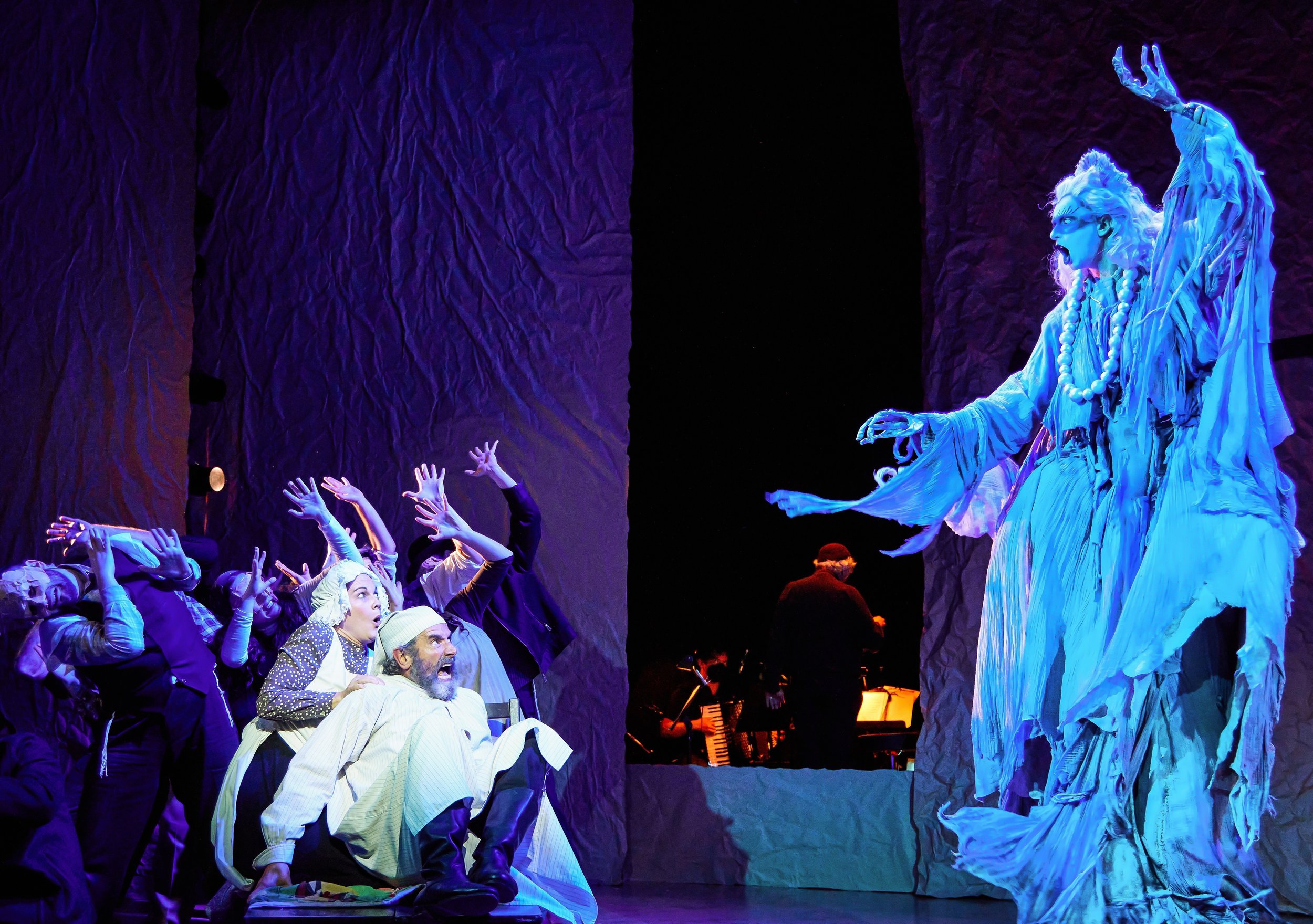Tevye (Steve Skybell, center) shields his wife Golde (Jennifer Babiak) from the ghost of Frume-Sore (Jodi Snyder), who comes to warn them not to wed their daughter Tsaytl to Layzer-Volf, her widower.
Sholem Aleichem, the famous Yiddish writer, satirized and chronicled Jewish life in the late 19th and early 20th centuries. The story of Tevye the dairyman, perhaps the best remembered of Aleichem’s works, and on which the musical Fiddler on the Roof is largely based, is being reprised by the National Yiddish Theater-Folksbiene in Yiddish—a production that premiered to acclaim before the pandemic and has now returned.
Fiddler’s primarily young cast, many of whom are not native speakers of Yiddish, fluently finesse the language’s nuances. Sheldon Harnick’s lyrics and Joseph Stein’s dialogue appear simultaneously as English supertitles: although not verbatim translations, they convey the plot and the characters’ actions and emotions.
Tevye’s daughers Hodl (Stephanie Lynne Mason, left), Tsaytl (Rachel Zatcoff), and Khave (Rosie Jo Neddy, right) dream of finding the perfect match.
In his village of Anatevke, Tevye is poor but respected; with his horse and cart he sells his products to eke out a living. With little or no dowry to offer, his burden is to marry five daughters to husbands who can support them. By today’s standards, Tevye seems autocratic and domineering, but according to tradition, with a capital T, it’s Tevye’s and his wife Golde’s prerogative to choose husbands for the girls, with Yente the matchmaker suggesting possibilities. Their choices as parents put them at loggerheads with daughter Tsaytl, who wants to marry Motl the tailor, and later, with daughters Hodl and Khave.
Among the most moving aspects of the play are the Tevye’s conflicted responses to changes around him, both from within his family and their broader environment. The shtetl—village—of Anatevke symbolizes the world in which Jews are not welcome, even in their Pale of Settlement, from which they are inevitably exiled.
Mendl, one of Anatevke’s residents, asks the town’s rabbi, “Is there a proper blessing for the Tsar?” The rabbi, in all earnestness, replies, “A blessing for the tsar? Of course. May God bless and keep the tsar…far away from us!”
Tevye (Skybell) welcomes the Sabbath in prayer, together with his wife Golde (Babiak, center) and Tsaytl (Zatcoff).
Director Joel Grey’s stellar direction has harnessed Steve Skybell’s forceful personality and earthy physicality, which has its own blustery grace. He stops short of allowing the sublimely gifted Skybell as Tevye to steal the show. While Tevye’s role is central to the story, other cast members contribute to the humor and the drama in the up-again, down-again fortunes of all of Anatevke’s residents. Notable among them are Jennifer Babiak, whose mellifluous voice as wife Golde shines through in the ensemble numbers. Lisa Fishman provides comic relief as Yente, the meddling matchmaker. Bruce Sabath is the volatile but sometimes generous butcher Leyzer-Volf. Jodi Snyder is terrifying as the spirit of Leyzer-Volf’s dead wife Frume-Sora, and Ben Liebert excels as the diminutive, nebbishy Motl, who, despite his initial timidity, summons the courage to win Tsaytl’s hand.
The musical numbers, by composer Jerry Bock and Harnick, are beautifully executed, particularly the ensemble numbers “Shabes Brokhe” (“Sabbath Prayer”) and “Tog-ayn, Tog-oys” (“Sunrise, Sunset”). Zalmen Mlotek’s precise, spirited orchestration enhances both the vocals and instrumentals. Only the Fiddler’s (Lauren Jeanne Thomas) wanderings onstage sometimes seems excessive; in the scene where Teyve negotiates Tsaytl’s engagement to Leyzer-Volf, the Fiddler’s presence is more distracting than helpful.
Fyedke (Michael Nigro) gives a book to Khave (Neddy, right).
Grey has placed the minimal, multipurpose furnishings and props within Beowulf Boritt’s set, where, according to each scene’s needs, they can be carried and set, nearly effortlessly, by cast members. The brilliant choreography of Staś Kmieć nods to the influence of Jerome Robbins (Fiddler’s original choreographer). The ecstatic dancing elicits genuine joy within pathos. Despite the community’s helplessness among its oppressors, the momentary, fleeting elation at Tsaytl’s engagement spurs a kozatsky (squatting) dance among the Russian patrons; at her wedding, the joy reverberates in the traditional circle dances and the bottle dance. Ann Hould-Ward’s costume choices for both Anatevke’s residents and the Russian peasants are a vibrant antidote for the village’s drabness.
As the world changes, Tevye confronts his own dependence on tradition, reconciling himself to two daughters’ marriages. He doesn’t accept daughter Khave’s Gentile husband and follows the shiva tradition—mourning a family member who intermarries, as if he or she is dead. Yet Khave comes to him before they depart Anatevke, and this conflicted father quietly blesses her. The musical is as much about Tevye facing modernity as his family issues. By the time Tsaytl marries Motl, men and women are dancing publicly with each other. Just like with the pogroms that ultimately banish Anatevke’s Jewish community, there is no turning back the clock for Tevye, his family, and compatriots.
Fiddler on the Roof in Yiddish runs at New Word Stages (340 W 50th St.) through Jan.1. Evening performances are at 7 on Monday, Tuesday, and Saturday and at 7:30 on Wednesday, Thursday and Sunday; matinees are at 2 p.m. on Wednesday and Thursday, and 3 p.m. on Sunday (at 2 p.m. on Dec. 25). For more information, or to purchase tickets, contact the box office at (646) 871-1730 or visit newworldstages.com.






